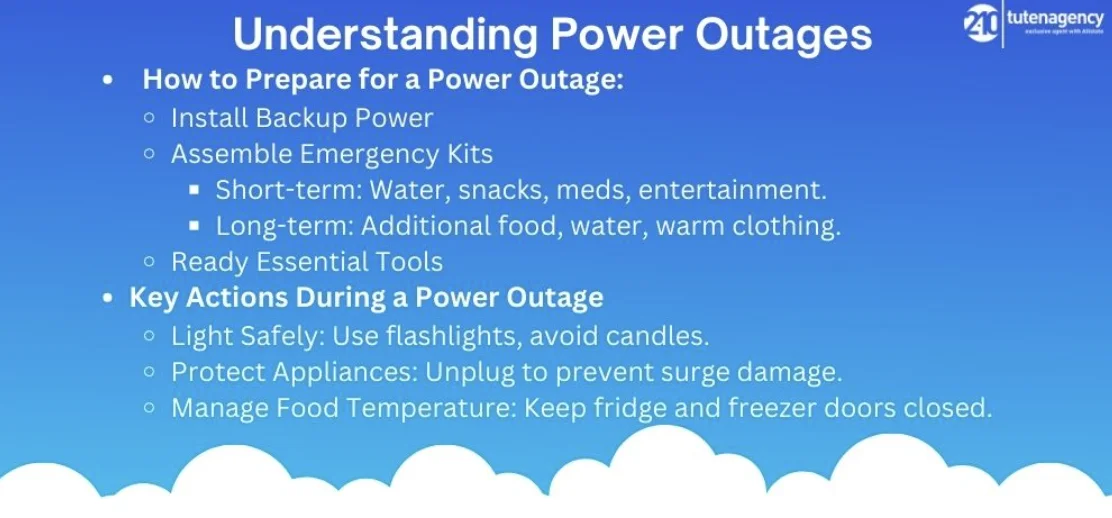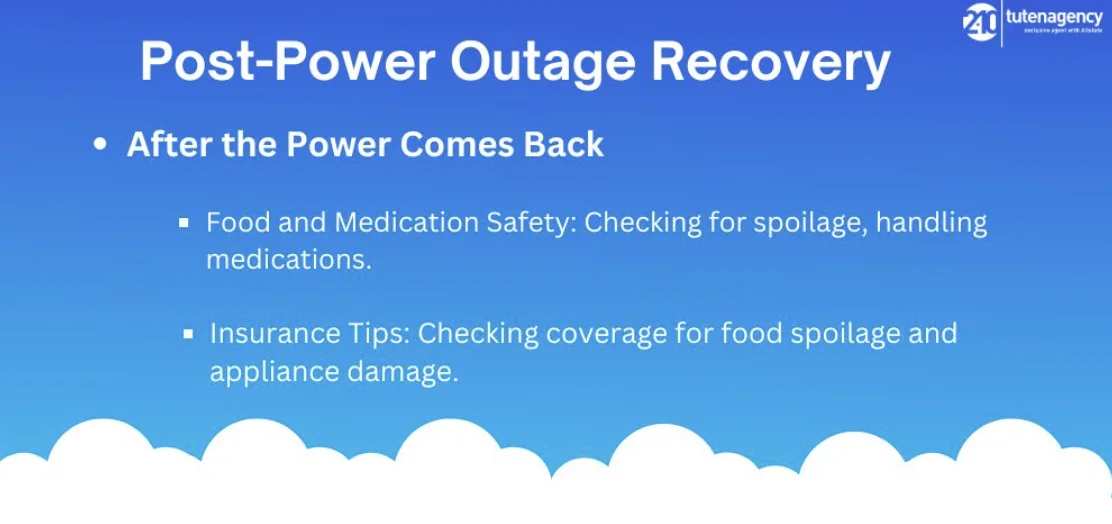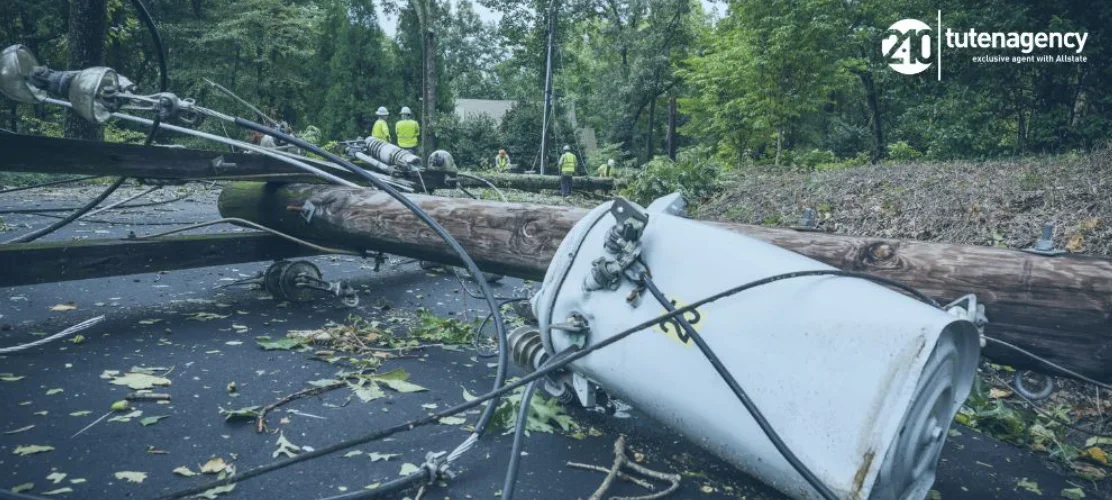Power outages are a frequent occurrence and can majorly interfere with daily activities and business functions. Often resulting from severe weather, technical failures, or utility maintenance, these interruptions can occur without warning. Proactively preparing can mitigate the inconvenience and potential risks associated with power outages, making it crucial for homes and small businesses to have a plan.
Preparation Before a Power Outage
-
Installation of Backup Power:
Investing in a backup generator ensures a dependable power supply during outages, keeping essential appliances and systems like refrigerators, heaters, and medical devices operational. This continuity is especially vital for small businesses that depend on power for operational integrity.
-
Short-term outages: Assemble a basic emergency kit containing bottled water, non-perishable snacks, essential medications, and activities like books or board games to stay occupied.
-
Prolonged outages: For extended disruptions, your kit should include additional resources such as extra blankets, warm clothing, and sufficient food and water supplies for several days.
-
Readiness of Essential Tools:
Store flashlights, a battery-powered radio, and spare batteries in an easily accessible location to ensure they can be quickly found in the dark. It’s also wise to regularly test and maintain smoke detectors and keep an appliance thermometer in your freezer to check on the safety of your stored food if the power is out for an extended period.
Actions During a Power Outage
-
Safe Lighting:
Opt for flashlights or battery-operated candles to avoid the fire risks associated with traditional candles. This is particularly important in unfamiliar settings or stressful situations where accidents can occur easily.
-
Electrical Equipment Care:
-
- Turn off and unplug your electronics and appliances during an outage to protect them from possible damage due to electrical surges when the power is restored.
-
- Leave one light switch on to easily identify when power is restored, allowing you to reconnect devices systematically.
-
Food and Appliance Management:
Reduce the number of times you open the refrigerator and freezer doors to keep the internal temperature low and preserve perishables longer. Using blocks of ice can further extend the cooling effect, ensuring that food remains at a safe temperature.

Generator Safety
Generators are invaluable during power outages but must be used correctly to avoid dangers like carbon monoxide poisoning. Always operate portable generators outdoors and away from windows, doors, and vents. It’s vital to ensure adequate ventilation to prevent the accumulation of harmful gasses.
Communication and Updates
Maintaining communication is key during a power outage. A battery-powered radio will keep you informed of weather updates and news. Using your mobile device or computer, access local news outlets and utility companies online to stay informed about the duration of the outage and restoration efforts.
Post-Power Outage Measures
-
Assessment of Food and Medication:
-
- If power is interrupted for more than two hours, inspect refrigerated food for spoilage. Dispose of any food that has been at temperatures above 40°F for an extended period or exhibits signs of spoilage.
-
- If the power outage lasts more than 24 hours, medications that require refrigeration may need to be replaced. Contact your healthcare provider promptly to ensure continuity of care.
-
Insurance and Financial Considerations:
Review your home or business insurance policy for specific coverages related to power outages, such as food spoilage and appliance damage. Understanding these details before an incident can expedite the claims process and reduce financial losses.

Conclusion
Being well-prepared for power outages ensures minimal disruption to your daily life and business operations. By establishing a comprehensive response plan and regularly updating your preparedness measures, you can navigate these challenging events with confidence and safety. Keep your emergency kits stocked, review your insurance coverage periodically, and stay informed about the best practices for power outage preparedness.
FAQs
What are the best food safety practices during a power outage?
Keep refrigerator and freezer doors closed as much as possible to maintain the temperature. A refrigerator will keep food cold for about four hours if unopened. A full freezer will hold its temperature for about 48 hours (24 hours if half-full). If possible, pack perishables into coolers with ice. After the power is restored, check temperatures—if food has been above 40°F for two hours or more, discard it.
How can I stay cool in a power outage during hot weather?
To stay cool during a power outage in hot weather, stay hydrated and wear light clothing. Close blinds or curtains to keep out the sun and retain cooler air indoors. If safe, stay on the lowest floor of your home where it is usually cooler. Consider going to a community center or a public place with power if the heat becomes unbearable.
How can I communicate with others if cell phone networks are down during a power outage?
If cell phone networks are down, use text messages or social media on mobile data, which might still be operational, to communicate. Keep calls brief to conserve battery life. Consider using a landline if available, as they do not depend on local power and often work during a power outage. Have a battery-powered or hand-crank radio to receive information if all else fails.
Is it necessary to turn off my solar panels during a power outage?
Generally, it is not necessary to turn off solar panels during a power outage; however, if your system is connected to the grid and does not have a battery backup, it will automatically shut down as a safety measure to prevent sending electricity back into the grid and endangering workers fixing the power lines. If you have a battery system, it can continue to power your home independently.
Get the right coverage for your home with tutenagency
New tutenagency customers?
Quote homeowners insurance online or call (334) 502-5111 to insure your home.
Legal Disclaimer: ADVERTISING MATERIAL ONLY. Do not rely on this site or this article for legal or financial advice. The information provided on 210agency.com is strictly for educational purposes and to provide you with general educational information. Since state laws and financial regulations are subject to change, please schedule an appointment with an attorney or qualified financial advisor in your area to further discuss your personal situation. This public information is neither intended to, nor will it, create an attorney-client or financial representative relationship.

